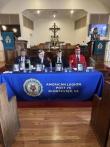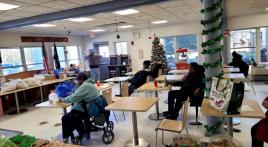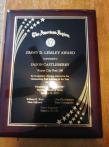THE MISSION was authored by John T. “Tom” Allen for a contest, which he did not win. Posted to Italy during WWII, Tom was an Army Air Force staff sergeant who served as a B-24 waist gunner from 1943-1944. After the war, he settled in Pittsburgh and raised his family. Tom passed away on Nov. 16, 2009, at age 85.
The original manuscript was shared with me in 2011 by a former colleague of mine, Dr Carolyn Dunn. It is being published now to honor the original author, and to offer readers an insight into some of the less dramatic and in hindsight more humorous episodes associated with flying combat missions during WWII. Some editing of the original manuscript was done to ensure it complied with publication requirements. However, the original manuscript is available upon request.
Dr. Carolyn Dunn is an assistant professor at East Carolina University and one of Tom’s nieces. Robert A. Chin is an East Carolina University professor emeritus. ~RAC
THE MISSION: A True Story
In the fall and winter of 1944, I was a gunner on a B-24 bomber. We were stationed in Italy, near the Adriatic Sea. Our crew lived in a tent, situated in an ancient olive grove. On this morning, we were extremely restless; we had been grounded for four days because of poor flying weather. Italian winters could be brutal.
This was to be our 21st mission. We were up at 5:00 a.m., ate our breakfast, went to a briefing, took off and were on our way. The briefing had begun normally enough. Once we saw the target, the routes to and from the fighter escort, and the heaviest anti-aircraft areas, our stomachs settled down and we focused on the flight ahead. “Stormy,” the weather officer, (all weathermen were nicknamed “Stormy”), said things looked good, with open skies all the way to the target, which was an oil refinery in Austria. Outside air temperatures at 24,000 feet, our bombing altitude, would be 60 to 65º below zero.
A colonel from Wing Headquarters walked to the podium, and proceeded to issue a stern warning to all crews. Recently, there had been incidents wherein two airmen had forgotten their oxygen masks. Their planes had to leave their formations and return to base. This was a very dangerous undertaking. Enemy fighters looked for stragglers. On the way to the equipment shack, we discussed the subject at great length. “How,” we asked each other, “how could this happen?” We decided that they must have been rookies; old-timers would never be so careless. At 24,000 feet, a man could expect to live a minute and a half without oxygen.
We got our parachutes and cold-weather gear from our lockers, went out to the plane, threw them aboard, warmed ourselves at the crew chief’s fire, and still talked about the errant flyers.
The air was nippy. We handed the winter quite well on the ground, but in the high altitudes we needed help. We wore heated suits. The coat, trousers, boots and gloves all plugged into each other, and then into an outlet in the fuselage. We stayed warm, even in the coldest weather. I have flown, many times, standing beside my open window, and had my oxygen mask clogged with my frozen breath. I had to twist it, like a plastic ice cube tray, to free it again. My electric suit, however, kept the rest of me comfortable.
After 20 missions, our in-flight routine was almost a ritual. Once we were airborne, we got very serious. Those of us in the back of the airplane sat on a bulkhead, and donned our suits. All of us, that is, except one!
I reached into my bag, felt around, and came up with nothing! “My imagination,” I thought, and probed again, but it was not there. I was devastated. “What could have happened?” I shut my eyes, and I could see my suit, swinging devilishly, back and forth, in the locker. Now I remembered. We had been so absorbed in the missing mask wrangling, I double-checked mine--but I had forgotten my heated suit. I went over to Tony, the belly gunner. Sheepishly, I asked him: “do you have any extra clothes?” Sometimes we would toss extra socks or gloves into our bags. He immediately guessed my problem. He had no spare clothes. He asked: “what are you going to do?” “Do?”, said I. “I’m going to freeze to death!” He wanted to tell the pilots, but I refused to allow it. I would see this through. No colonel from Wing Headquarters would discuss me at some future briefing.
Even now, it was getting cold. “Much more to go,” I thought. Tony was in his turret; the tail gunner in his, and I was alone with my short life flashing before me. It got colder. We climbed higher. I stomped. I did “jumping jacks,” and flailed my arms. I prayed. The frost caked the metal machine gun. I prayed again, faster. It got colder. I stared out of the window at the snowy Alps below, trying desperately not to think of what lay ahead. Now I was not so brave, but it was too late. I petitioned: “Lord, I’ve really done it this time. Will you help me?” The icy mountains looked up at me. I thought of bailing out, but that would mean death for sure. I still would not tell the pilots. I was very, very cold. I prayed again. I looked out of the window once more. We had not yet reached our assigned altitude, and I was freezing. “Sixty-five below, yet to come,” I mumbled.
Suddenly, it happened! As I looked far ahead, I saw 300 B-24s begin a long, lazy 180º turn. I thought I was delirious. The command radio crackled: “Target obscured. Mission canceled. All aircraft return to base!”
We were at 18,000 feet when the recall came, but the bitter cold was suddenly forgotten. The wicked alpine chasms, which had goaded me minutes before, were now tropical beaches. Tony came out of his turret grinning, and grabbed my arm. We hugged for a moment, and smiled happy smiles.
Back on the ground, I downed the traditional shot of whiskey, ate a doughnut and sipped hot coffee. Tony and I never revealed our secret.
On the way back to the olive grove, I jumped off at the chapel. I had a Man to thank! Deo Gratius!
John T. Allen
811 Hillsdale St.
Pittsburgh, PA 15234




